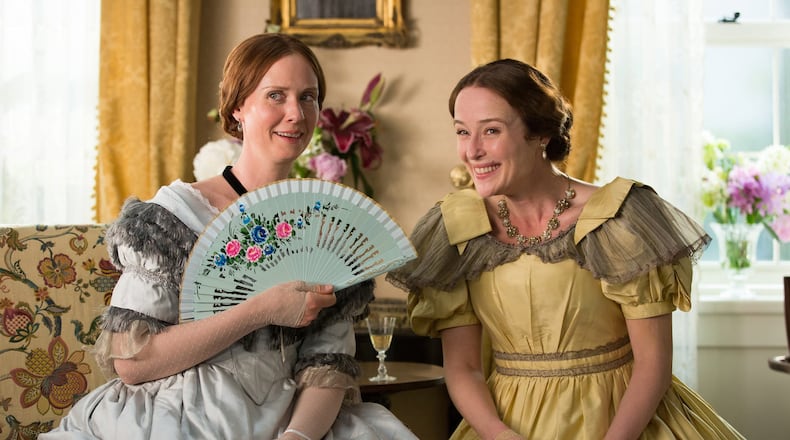BC-MOVIE-NIXON:SE - entertainment (700 words),0727
(PHOTO)
By Moira Macdonald
The Seattle Times (TNS)
“He would watch ‘Sex and the City’ with the sound off,” said Cynthia Nixon, in amused wonderment, of writer/director Terence Davies, “so he could watch my face.”
Davies, the British filmmaker behind such beautiful period pieces as “The House of Mirth” and “The Deep Blue Sea,” had Nixon in mind for a very non-Miranda role: the reclusive, brilliant 19th-century poet Emily Dickinson. At the Toronto International Film Festival last fall with that film about Dickinson’s life, “A Quiet Passion,” Nixon remembered her astonishment at being approached for the role.
She had, she said in an interview, auditioned for Davies once, long ago, and it didn’t seem to go well. “I couldn’t get a sentence out,” she said. “I thought he really hated me. But then he contacted me years later and told me he had written the script with me in mind.”
Dickinson, who spent much of her life quietly writing poetry in her room (she died at her family home in Amherst, Massachusetts, in 1866, at the age of 55) at a tiny writing desk, seems a far cry from Miranda Hobbes, the often-cynical “Sex and the City” lawyer whom Nixon played for six seasons on HBO. But the actor had a previous connection to the poet, dating back to her childhood, and was thrilled when the opportunity arose to play her.
“My mother was a huge fan (of Dickinson),” Nixon said. “We had a record at home of Julie Harris reading some of the poems, some of the better-known letters. And I would listen to it a lot; I memorized it by osmosis. I always felt a kinship with her. So when Terence approached me about playing her, it seemed too good to be true.”
Preparation for the role meant immersion into Dickinson’s life, reading biographies and learning about her lineage. “The Dickinsons were a more illustrious family than I realized,” said Nixon. “They were kind of the first family of Amherst. That came with certain privileges and it came with certain constraints — which the Dickinsons seemed to pay very little attention to.”
But mostly, it meant reading the poems, of which Dickinson wrote more than 1,700, most of them unpublished in her lifetime and found after her death in a locked drawer. Prolonged study of her work, said Nixon, was a joy; upon urging, she cited two favorite poems.
One is well-known, beginning”I heard a Fly buzz-when I died.” Nixon called it “a perfect work. If you’ve ever been in the room when someone dies, it captures so much of that sensation. But of course it’s Emily Dickinson, so she tells it from the dying person’s point of view.”
Nixon recited a few lines from her other “lifelong favorite” Dickinson poem, number 640, whose opening verse is “I cannot live with You-it would be Life-and Life is over there-Behind the Shelf.” The poem explores the despair of a love that isn’t possible “for so many reasons that we don’t really know,” said Nixon. “The pain is so palpable, and the depth of the hurt is so deep.”
An actor since her teens (movie fans might remember her as a very young maid in “Amadeus” back in 1984), Nixon has moved easily between stage and screen: She’s currently starring on Broadway in Lillian Hellman’s “The Little Foxes,” and is a three-time Tony Award nominee (she won in 2006, for “Rabbit Hole”). In our interview, she spoke of recently playing Nancy Reagan (for the TV movie “Killing Reagan”), and of her fondness for Seattle: Nixon’s wife, Christine Marinoni, is from Bainbridge Island, and the couple enjoyed a family vacation here last summer-especially the Underground Tour.
But it’s clear that Dickinson left her mark on Nixon, whose enthusiasm for the role shone through even at the end of a long day of interviews. The poet, said Nixon, was “so full of wonder and rapture and enthusiasm and love. She had so many disappointments and so much pain, but I think even in her bitterest, unhappiest state, she still retains that sense of wonder.”
About the Author
Keep Reading
The Latest
Featured


